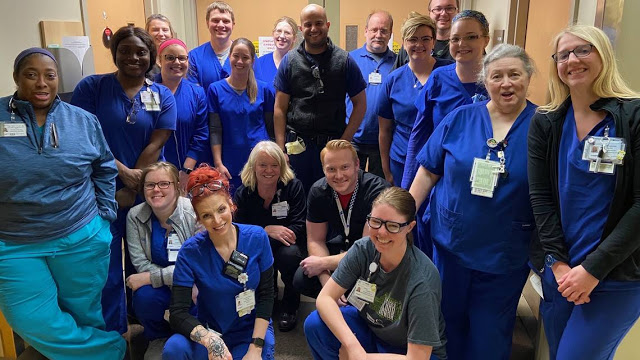Nursing homes say they need help; feds plan tests for places that haven’t yet been heavily hit by virus; Baptist furloughs employees

UK HealthCare employees sent this photo to thank a Lexington restaurant for providing them dinner.
—–
As news develops in Kentucky about the coronavirus and its covid-19 disease, this item will be updated. Official state guidance is at https://kycovid19.ky.gov.
- Nursing homes tell the Louisville Courier Journal that they are “short on masks, gloves and gowns that help protect against the deadly virus. And many homes don’t have the tools or the authority to test residents for covid-19 — including those who are coming from a hospital,” transfers that may be happening more frequently as hospitals free up beds in anticipation of covid-19 patients, Bailey Loosemore reports.
- The Trump administration is planning a testing program for cities and towns that haven’t been heavily hit by the virus, as a way of getting information needed to reopen the economy, Bloomberg reports.
- Baptist Health is furloughing employees, cutting executive pay cuts and making other staff changes, citing the coronavirus. While it didn’t mention Gov. Andy Beshear’s order that stopped elective surgeries, such orders have been cited as the reasons for hospital furloughs in Kentucky and other states. “Furloughs affect regular full-time and part-time employees who don’t support caregivers or aren’t critical to clinical operations related to covid-19, Baptist Health said in the announcement,” the Lexington Herald-Leader reports. “The University of Kentucky Chandler Hospital also has told workers it will redeploy some employees while others will have to apply for unemployment” benefits.
- The University of Louisville said it would furlough employees and reduce the pay of employees making $100,000 or more a year.
- UK HealthCare and Baptist Health have partnered with the Kentucky Blood Center to collect plasma from Kentuckians who have recovered from covid-19 to build up a “plasma bank” that can be used for serious or immediately life-threatening infections, says a UK Now news release. The Food and Drug Administration recently released guidelines to allow this investigative therapy, which could help covid-19 patients recover faster by offering passive immunity from the antibodies in the donated plasma. The Cynthiana Democrat reports on a man who had a mild case and donated plasma. Click here for the donor information form.
- One of Gov. Andy Beshear’s pastors talked with Jack Brammer of the Herald-Leader about the governor’s faith as the Beshear administration planned how to deal with a few churches that are still holding services despite his emergency orders.
- The state lottery warned of an increase in scam phone calls telling players they have won a big prize from the lottery, asking them to pre-pay taxes or provide bank-account information.
- A Lawrenceburg man faces menacing and disorderly-conduct charges, alleging he coughed on and threw punches at someone in the Walmart parking lot, The Anderson News reports. Ronnie Kelly’s “bond was set at $250 and his release conditions included a two-week medical quarantine,” the Herald-Leader reports.
- Senate Democrats blocked Majority Leader Mitch McConnell’s effort to add $250 billion to the new loan program for small businesses distressed by the pandemic, asking addition of $100 billion for hospitals and $150 billion for state and local governments. McConnell said, “I want to add more money to the only part of our bipartisan bill that is currently at risk of running out of money. . . . We cannot play games with this crisis.” House Speaker Nancy Pelosi said the House would not approve that under unanimous-consent rules that allow passage of bills with few members present.
- “Lexington restaurants are coping with the coronavirus shutdown but many are reaching out to give to others, too,” Janet Patton reports for the Herald-Leader. “Some are sending food to hospitals and first responders; others are feeding those in need, including fellow hospitality workers who have been laid off.”
- The Washington Post tells the story of how the Centers for Disease Control and Prevention traced a Chicago coronavirus cluster to two family gatherings, and how 16 likely cases and three deaths traced back to one person. The case study, published Wednesday, “is one of the most detailed looks at how covid-19 moves through communities and shows how a single person can set off a chain reaction of infections,” the Post reports. Here’s a CDC chart about the process, called contact tracing:
